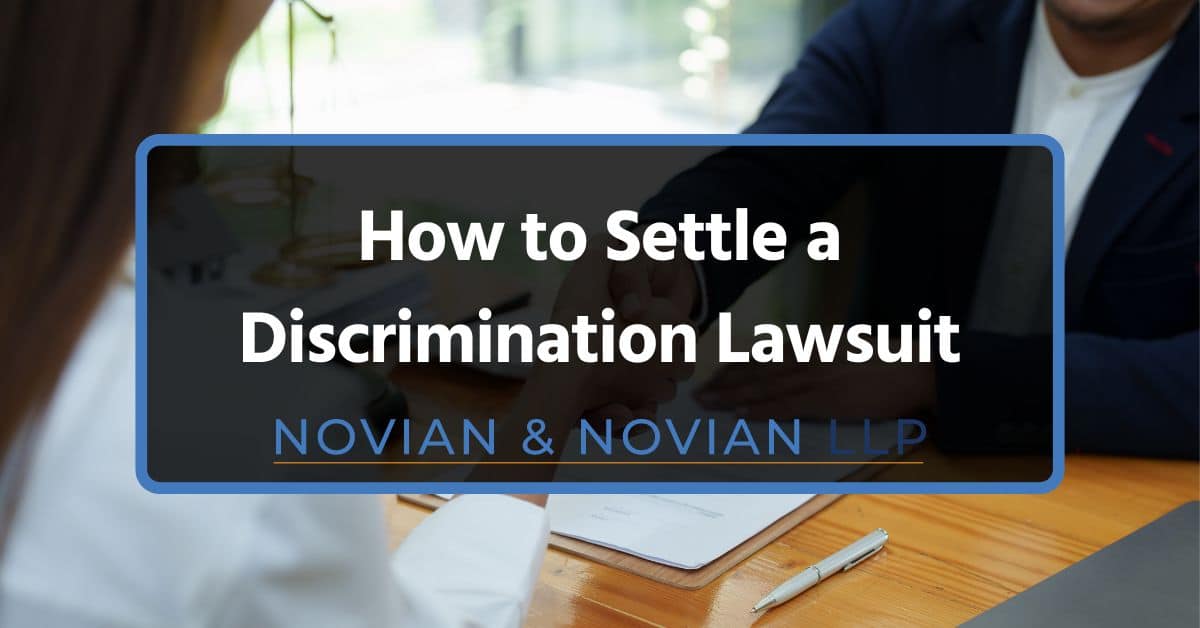
| July 11, 2024 | Employment Law
A discrimination lawsuit typically arises when an individual believes they have been treated unfairly or differently based on race, gender, age, disability, religion, or other protected characteristics. Settling a discrimination lawsuit involves understanding the allegations, seeking legal counsel, evaluating the case, engaging in settlement discussions, drafting the settlement agreement, obtaining necessary approvals, finalizing the settlement, and ensuring follow-up compliance.
Is your business facing a discrimination lawsuit and your wondering how to navigate the complex legal system? With over 30 years of experience, our employment lawyers at Novian & Novian, have represented and adviced numerous employers facing workplace discrimination lawsuits. If you need assistance to settle a discrimination lawsuit, don’t hesitate to contact us!
This blog post aims to provide a clear overview of what a discrimination lawsuit entails. We will also offer a guide through the process of settling such a lawsuit.
An Overview of Discrimination Lawsuits
Discrimination occurs when an individual is treated unfairly or unequally based on certain characteristics, leading to adverse effects on their employment, housing, education, or other aspects of life. The most common types of discrimination include gender, age, disability, and racial discrimination.
Thankfully, California has one of the most comprehensive anti-discrimination laws in the United States, governed by the Fair Employment and Housing Act (FEHA). FEHA protects employees from discrimination, harassment, and retaliation in the workplace. It covers all employers with five or more employees and protects against discrimination based on race, color, national origin, ancestry, religion, sex, pregnancy, etc.
Typically, a person can file an employment discrimination lawsuit against your company if they feel your organization displayed unfair hiring practices. An employee could also file a lawsuit for unequal pay if they feel they are receiving less pay for the same job because of a protected characteristic. Furthermore, employees could file workplace discrimination lawsuits for denial of promotions, unjust termination, and hostile work environment.
Types of Discrimination
- Age Discrimination.
- Disability Discrimination.
- Sexual Orientation.
- Status as a Parent.
- Religious Discrimination.
- National Origin.
- Pregnancy.
- Sexual Harassment.
Interestingly, discrimination and retaliation lawsuits are often interconnected. Retaliation occurs when an employer takes adverse action against an employee for engaging in protected activities, such as filing a discrimination complaint, participating in an investigation, or opposing discriminatory practices. Retaliation claims can be filed alongside discrimination claims if an employee faces negative consequences for asserting their rights.
What is a Settlement Agreement?
A settlement agreement is a legally binding contract between an employer and an employee to resolve a dispute, such as a discrimination case, without going to trial. This agreement typically includes the terms of the settlement, such as the amount of financial compensation, confidentiality clauses, and a waiver of future claims related to the dispute.
For the employer, workplace discrimination settlement can be more cost-effective than going to court as you get to avoid high legal fees, court costs, and potential punitive damages. You also get to enjoy confidentiality as settlement agreements often include confidentiality clauses to protect the employer’s reputation. Furthermore, settling is more time-efficient than going through the back-and-forth of court procedures, and settling provides a definite resolution to the dispute as compared to the uncertainty of a trial outcome.
On the other hand, employees get financial compensation from settlement agreements without the need for a prolonged court battle. Settling also allows the employees to move on without the stress and uncertainty of a trial.
What Is the Average Settlement for a Discrimination Lawsuit?
The cost of defense settlements usually varies depending on the case specifics. However, the average settlement for a discrimination lawsuit can range from $40,000 to $300,000. This is influenced by factors such as the severity of the discrimination, the impact on the employee, and the potential for punitive damages.
We often recommend that employers consider settlements rather than going to court as trials can be extremely expensive. A discrimination court case can cost employers anywhere from $50,000 to over $1,000,000,
The high legal costs often include attorney’s fees, court costs, expert witness fees, etc. Furthermore, courts can award high punitive damages if the employer’s behavior is found to be egregious. In addition, public trails can harm an employer’s reputation and brand.
How to Settle a Discrimination Lawsuit
A discrimination lawsuit arises when an individual believes they have been treated unfairly or unequally. This unfair treatment must violate employment discrimination laws, such as those outlined in Title VII of the Civil Rights Act of 1964.
It is always best to start the process of settling an employment discrimination case as soon as possible. This helps to preserve evidence, reduce legal costs, and lead to a quicker resolution. Typically, the goal is to reach a fair settlement that compensates the victim and ensures compliance with anti-discrimination laws.
Steps to take when settling a discrimination lawsuit are:
1. Seek Legal Counsel
Hiring an experienced attorney specializing in discrimination cases is always best for employment discrimination cases. This attorney will provide valuable legal advice, help navigate the complex legal system, and represent your interests effectively.
During the initial consultation, your attorney will evaluate the merits of your case, gather preliminary information, and outline potential strategies. This step helps to build a strong foundation for your case.
At Novian & Novian, our employment lawyers are always ready to come up with strategies that would be in your best interest!
2. Gather Evidence
Having solid evidence is the backbone of any discrimination case, as proper documentation can strengthen your position and support your claims. Therefore, you must document evidence such as emails and written communications, employment records, performance reviews, incidence reports, and witness statements.
You must keep all documents organized and securely stored. It helps to create a chronological timeline of events and ensure that all evidence is easily accessible and well-preserved.
3. Review the Complaint
Filing a complaint with the Equal Employment Opportunity Commission (EEOC) or a relevant state agency is often the first step in a discrimination case for employees. This initiates an official investigation into your claims.
As an employer, you have a duty to review the complaint and respond once it’s brought to your attention. To help you better understand what that would entail we suggest you look at our example response to an EEOC charge of discrimination and use it as a guide on responding to an EEOC charge.
The EEOC investigation process includes reviewing the complaint, gathering evidence, and interviewing witnesses. This can take several months to over a year, depending on the case’s complexity.
Potential outcomes of the EEOC investigation could be a dismissal of the charge or the issuance of a right-to-sue letter. They could also recommend mediation or settlement.
4. Negotiate a Settlement
To negotiate a settlement, you should clearly outline your demands and expectations and also be prepared to compromise. Furthermore, keep communication professional and focused on resolving the issue.
Before agreeing to any settlement agreement, you need to consider elements like monetary compensation. This includes lost wages, compensatory and punitive damages, etc. You should also consider reinstatement or changes in employment status and policy changes to prevent further discrimination.
Typically, employment lawyers should lead negotiation settlements, draft, and review settlement agreements. This ensures that all terms are fair, legally sound, and in your best interest.
5. Review and Sign the Settlement Agreement
Before signing a settlement agreement, carefully review it to understand all terms and conditions. It is important to ensure that it meets your needs and addresses your concerns.
While reviewing, you would come across common clauses and terms like confidentiality clauses, non-disparagement clauses, release of claims, and payment of terms. To learn more about these terms, make sure you reach out to your discrimination lawyers for clarity.
Furthermore, signing the agreement usually means waiving your right to pursue further legal action related to the discrimination claims. Therefore, it is important to ensure the settlement is fair and just before signing.
6. Compliance and Follow-Up
Both parties must comply with the settlement terms. This includes making agreed payments and implementing policy changes. Then, you should regularly monitor compliance and promptly address any breaches with the help of your attorney.
Additionally, your attorney can assist in ensuring compliance and taking legal action if the settlement terms are not met.
What are Compensatory Damages?
Compensatory damages are financial awards given to plaintiffs in discrimination cases to cover the actual losses they have suffered. These can include lost wages, medical expenses, and emotional distress. The goal is to restore the financial position of the victim as if the discrimination had not occurred.
An example of compensatory damages might include an employee who was unfairly terminated due to racial discrimination. The employee could be awarded compensatory damages to cover their lost wages during the period of unemployment, medical expenses for treatment of stress-related conditions, and compensation for the emotional distress experienced due to the wrongful termination.
Compensatory damages are calculated based on the actual losses incurred by the plaintiff. This calculation can include lost wages (the amount of income the plaintiff would have earned if the discrimination had not occurred), medical expenses (costs for medical treatment and therapy resulting from the discrimination, and emotional distress (compensation for mental anguish, stress, and emotional harm caused by the discriminatory actions). It could also include other economic losses directly related to the discrimination such as relocation costs or job search expenses.
On the other hand, punitive damages are awarded to punish the employer for particularly egregious behavior and to deter future discriminatory practices. Punitive damages intend to send a strong message against the wrongful conduct.
How Can an Employer Defense Attorney Help?
A legal defense is the evidence an employer uses to refute claims made by employees or government agencies. These defenses are what will be utilized by your discrimination lawyers to ensure that the verdict is in your best interest.
In addition, an employer defense attorney specializes in representing employers in legal disputes related to employment law. These attorneys provide legal defense against claims of discrimination, harassment, wrongful termination, wage and hour violations, and other employment-related issues. Their primary role is to protect the interests of the employer by providing legal counsel, representation in court, and strategic advice to mitigate legal risks.
What to do if you are being sued for discrimination?
Being sued for discrimination can be challenging, but taking the right steps can help you navigate the situation. To settle a discrimination case, you should seek legal counsel, gather evidence, review the complaint, negotiate a settlement, review and sign the settlement agreement, and ensure compliance and follow-up.
Furthermore, if you are being sued for discrimination, you should seek professional legal advice immediately. An experienced attorney can guide you through the complexities of the legal process, protect your rights, and help you achieve a fair settlement.
If you are facing a discrimination lawsuit, contact us at Novian & Novian for expert legal assistance. Our experienced employment law attorneys can provide you with the support and guidance you need to handle your case effectively!
Contact Us
Have questions about this post? Novian & Novian is a full service law firm in Los Angeles with clients that span the country. Contact us today for a free consultation.
Contact Us
Have questions about this post? Novian & Novian is a full service law firm in Los Angeles with clients that span the country. Contact us today for a free consultation.




